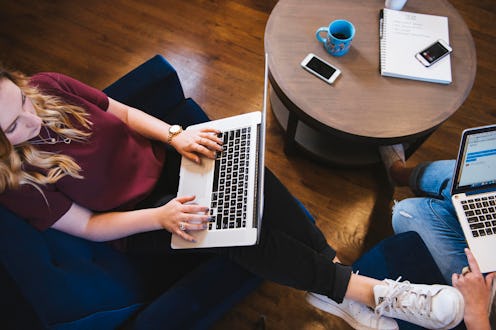Life
Researchers Found A Way To Objectively Measure Unequal Treatment

A new paper published in Proceedings of the National Academy of Sciences suggests that discrimination may be predictable, according to researchers from the University of California Berkeley Haas School of Business. Ming Hsu, associate professor at the Berkeley Haas School of Business, tells Bustle that the study shows how to make predictions about people’s behavior based on their beliefs in stereotypes about those other groups of people.
"There is a tendency for people to think of stereotypes, biases, and their effects as inherently subjective,” Hsu said in a news release. “Depending on where one is standing, the responses can range from 'this is obvious' to 'don't be a snowflake. What we found is that these subjective beliefs can be quantified and studied in ways that we take for granted in other scientific disciplines."
Hsu tells Bustle that the study answers a couple of different questions about stereotypes and biases. The first is whether we can measure and predict the effects of our biases — which are intangible because they’re in our heads — in a tangible way. For the sake of this study, Hsu says, they measured that through dollars and cents by using the “Dictator Game,” where each player was given $10 and was asked to decide how much to give the other players based on a single piece of information they were given about each of the other players. According to the news release, players doled out different amounts to different players depending on their occupation, ethnicity, or nationality, such as $5.10 to a player described as "homeless," $1.70 to the player described as a "lawyer," and $1.90 to the player described as the "addict."
The second question researchers sought to answer, Hsu tells Bustle, is the advantages and disadvantages associated with various stereotypes. “For example, do stereotypes about one being ‘female’ affect how one is treated more than say ‘Hispanic?'” Hsu tells Bustle. “If so, how much more or less? This is particularly challenging, as there are nearly infinite ways that people can stereotype different social groups,” especially as many people identify with many different, overlapping ways in which they're marginalized. Hsu tells Bustle that, based on their findings, the researchers were able to develop a computational model that essentially predicted discrimination. “We then further validated this model could predict behavior in a previously published labor market field experiment involving 13,000 resumes,” Hsu tells Bustle. “Specifically, we were able to predict the likelihood that someone would be called back when applying for a job.”
Perhaps the knowledge that we all have biases will help us all take a step back.
Dr. Sherry Benton, founder and chief science officer of TAO Connect, tells Bustle that this study is consistent with other research on bias. “We know that if you change the name on a resume and give it to people to evaluate, the change in gender or in race will change the evaluation,” Benton tells Bustle. “This is usually in the absence of other information. More contact and relationship with people modifies these perceptions.”
Benton tells Bustle that we all grow up forming personal constructs to make sense of the world. “In short, everyone has biases. It would be nearly impossible to grow up without some stereotypes, racism, sexism, ageism, or some other ‘isms,’” Benton tells Bustle. “It is helpful to be more consciously aware of our constructs and question our assumptions.”
Hsu said in a news release that he hopes this study helps provide a more rational approach to what has been a very emotionally-fraught topic. Perhaps the knowledge that we all have biases — and that those biases are measurable — can help us take a step back before reacting to any given situation, to prevent people from experiencing discrimination and bias.